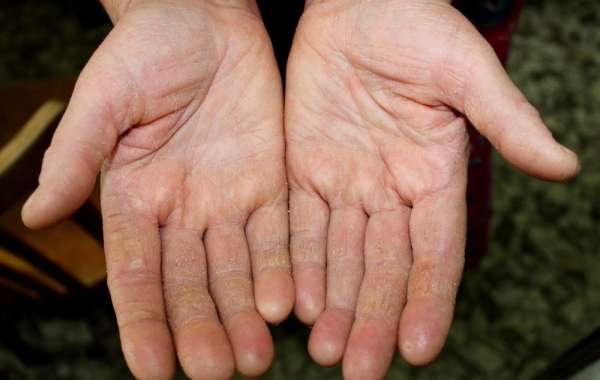Palmoplantar keratoderma (PPK) is a rare, chronic skin condition that causes thickening of the skin on the palms and soles, often resulting in painful cracks, inflammation, and compromised mobility. PPK can have a variety of genetic causes, and though it impacts daily life significantly, treatment options have historically been limited. However, recent clinical trials and research are bringing new hope for individuals affected by PPK. Here, we explore the latest developments and insights into clinical trials focused on this condition, offering an overview of emerging treatments, the potential of targeted therapies, and ongoing challenges in PPK research.
Overview of Palmoplantar Keratoderma and Treatment Challenges
PPK is typically categorized into hereditary and acquired forms. Hereditary types, such as keratin, are often linked to genetic mutations affecting proteins in the skin. Given the limited number of treatment options and variability in PPK presentation, clinical trials are essential to finding therapies that address the condition's physical symptoms and the underlying genetic factors contributing to its development. Current treatment options, such as emollients, keratolytic agents, and retinoids, aim primarily to manage symptoms. However, these treatments are not always effective and can have side effects, highlighting the need for new therapeutic approaches.
Promising New Trials and Treatments
KM-001 and KM-023 by Kamari Pharma
One of the most promising advancements in PPK treatment comes from Kamari Pharma, which investigates TRPV3 inhibitors as a potential therapeutic pathway for PPK. TRPV3, a protein involved in skin integrity and inflammation, has been linked to PPK pathophysiology. Kamari Pharma’s two investigational drugs, KM-001 (topical) and KM-023 (oral) target TRPV3 to reduce inflammation and improve skin barrier function. In preclinical studies, both treatments demonstrated safety and efficacy in models of PPK. The drugs are currently progressing through clinical trial phases, with preliminary human trials indicating promising results in both effectiveness and tolerability. If successful, these TRPV3 inhibitors could represent the first class of medications specifically targeting PPK at a molecular level.
SiRNA-Based Therapies
Small interfering RNA (siRNA) therapies are also under exploration for their potential to target specific genetic mutations linked to PPK. By silencing or modifying problematic genes involved in the disease’s progression, siRNA-based treatments could provide a precision medicine approach to PPK. Ongoing studies are focusing on optimizing delivery mechanisms and minimizing side effects. Still, the targeted nature of siRNA therapies makes them a promising avenue for treating genetically rooted forms of PPK.
Topical Retinoids and Retinoid Analogues
Traditional retinoid treatments, often used for various skin conditions, are somewhat effective for PPK. However, researchers are now developing modified retinoid analogs that offer the benefits of retinoids with reduced side effects. New trials are investigating these analogs as part of combination therapies that could increase the efficacy of PPK treatment by pairing them with anti-inflammatory agents.
Topical and Systemic Retinoids
Modified retinoids, known for their ability to regulate skin cell production, are also being tested for PPK, particularly in combination with anti-inflammatory drugs. Unlike traditional retinoids, which can cause side effects like redness and peeling, newer formulations aim to provide a gentler approach, reducing side effects while maintaining efficacy. Clinical trials with retinoid analogs investigate whether combining these with other agents can optimize treatment outcomes.
Protein Replacement Therapies
For certain hereditary forms of PPK caused by protein deficiency, protein replacement therapy is being researched to replenish the missing or malfunctioning proteins in the skin. This approach may help address specific genetic causes of PPK, though challenges remain in developing stable and effective protein therapies suitable for long-term use.
Gene Therapy Trials for Genetic Forms of PPK
Gene therapy is another promising area for individuals with genetic forms of PPK. Gene therapy offers a potential long-term solution by directly modifying the faulty genes responsible for skin abnormalities. While gene therapy for skin conditions is still largely experimental, several research centers are developing approaches specific to PPK. These trials are in the early stages but could eventually provide a curative option for hereditary PPK types, offering life-changing benefits for affected individuals.
Patient Participation and the Importance of Clinical Trials
Due to the rarity of PPK, patient recruitment for clinical trials can be challenging. However, patient advocacy groups and specialized clinical research organizations are working to connect patients with clinical trials to ensure broader participation. Greater patient involvement not only aids in developing effective treatments but also accelerates regulatory approval processes. Additionally, Palmoplantar keratoderma clinical trials provide patients with early access to experimental treatments that may be more effective than conventional ones, thus offering hope to those struggling with limited treatment options.
Challenges in PPK Clinical Research
Despite these advancements, PPK research faces several challenges. The variability of symptoms among PPK patients and the condition's rarity make standardizing trials difficult. Additionally, limited funding for rare diseases can constrain the pace of research. However, recent advancements in genomics and molecular biology are helping overcome some of these obstacles, enabling researchers to tailor trials more effectively to meet the needs of diverse PPK patient populations.
Future Directions in PPK Treatment
The future of PPK treatment looks promising, with several experimental therapies demonstrating potential in early-phase trials. As TRPV3 inhibitors, siRNA therapies, and gene editing technologies continue to develop, PPK patients may soon have access to more effective, tailored treatment options. Continued research into PPK's genetic and molecular underpinnings will be crucial in advancing these therapies from clinical trials to mainstream treatment.
In summary, while PPK remains a challenging condition to treat, recent advances in clinical trials and genetic research pave the way for new therapeutic approaches. With continued innovation and collaboration between researchers, pharmaceutical companies, and patient communities, there is hope that effective, targeted treatments for PPK will soon become available, improving the quality of life for those affected by this rare skin condition.




